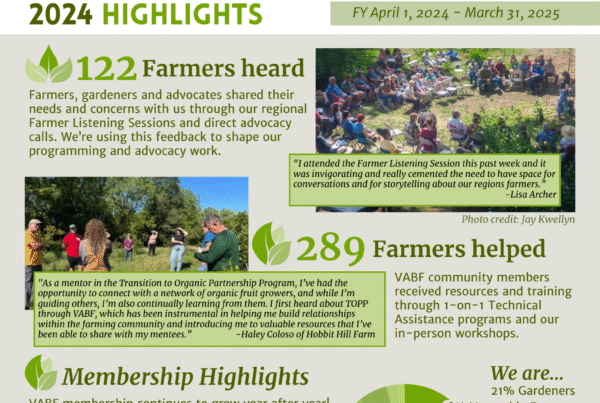Virginia Agricultural Best Management Practices Cost-Share Program
$73 million available to help farmers protect water quality and build soil health
The Virginia Department of Conservation and Recreation (DCR) has announced a cost-share program to help Virginia producers and land owners to implement best practices for protecting water resources and soil health. A total of $73 million is available this year (July 1, 2019 through June 30, 2020) to support adoption of conservation plans and practices for cropland, pastureland, hay land, and forested land. Examples include:
- Livestock stream exclusion – fencing and other infrastructure to keep livestock out of streams and provide watering facilities
- Riparian forest and herbaceous buffer plantings
- Sod waterway, filter strips, permanent cover for critical areas.
- Nutrient management planning and practices
- Cover crops for soil conservation, nitrogen (legumes), and nutrient recovery
- Cover crops for vegetable rotations and other specialty cropping systems
- Composting facility
- Strip cropping
- Integrated pest management
The program is a partnership between Virginia DCR and soil and water conservation districts. Individuals, partnerships, trusts, and other businesses operating farms in Virginia may qualify for cost-share assistance. Applications are accepted throughout the coming year (to June 30, 2020) and funding is awarded on a priority-ranking basis for greatest water and soil health benefits.
For more information, visit https://www.dcr.virginia.gov/soil-and-water/costshar2. To apply, visit your Soil and Water Conservation District office.
Action Alert: Promoting Local Food in Public and Private School Systems
Farm to School Act of 2019 and Kids Eat Local Act Introduced
Bipartisan support in House and Senate
Republican and Democratic Senators and Representatives have recently introduced legislation – the Farm to School Act of 2019 (S. 2026, H.R. 3562) – that would triple funding for the USDA Farm to School Grants Program from $5 million to $15 million per year. Farm to School Grants support projects that bring kids out to local farms and bring local foods into school meals programs. Another bipartisan bill, the Kids Eat Local Act (S.1817, H.R. 3230) would remove barriers to procurement of locally produced foods for school meal programs.
These are “marker bills,” intended to become part of the Child Nutrition Reauthorization Act (CNR), which is now in process on Capitol Hill. The more Democratic and Republican co-sponsors we can recruit, the more likely that the CNR will expand the Farm to School Grants Program, and help school systems procuring local foods for school meals.
What you can do:
First, call your Representative and both Senators to ask them to co-sponsor the Farm to School Act of 2019 and the Kids Eat Local Act. Here in Virginia, you can reach Senator Mark Warner at 202-224-2023 and Senator Tim Kaine at 202-224-4024.
Second, sign the petition asking Members of Congress to support these two bills. The petition is at http://bit.ly/f2sact2019.
For more on these two bills, see the following NSAC blog posts:
http://sustainableagriculture.net/our-work/campaigns/child-nutrition-act-reauthorization/.
http://sustainableagriculture.net/blog/farm-to-school-act-2019/.
http://sustainableagriculture.net/blog/kids-eat-local-act-2019/.
VABF Policy Team Launched E-mail List Serve
The VABF policy team has established an e-mail list serve for any VABF members who would like to stay up to date on policy developments for family farms and sustainable/ organic agriculture, and engage in dialogue on policy advocacy issues. If you would like to join, contact Jill Auburn at Jill.auburn@verizon.net.
VABF Members Attend Virginia NRCS Meeting
Conservation programs emphasize water quality, soil health, beginning and historically underserved producers
On June 27, the Virginia office of the USDA Natural Resources Conservation Service (NRCS) held a meeting of its State Technical Committee (STC). Virginia’s STC is made up of conservation professionals, representatives of state government agencies and non-governmental organizations, and other stakeholders, who provide input on program implementation to the State Conservationist and other personnel at the NRCS office in Richmond.
After a hiatus of a few years, two VABF members who are on our policy team – Jill Auburn and Mark Schonbeck – attended the June, 2019 meeting, which included about 30 participants. This provides us an opportunity to learn more about implementation of NRCS Conservation Programs under the 2018 Farm Bill in Virginia, and provide suggestions for greater benefit to farmers, soil and other resources, and long term sustainability.
A few highlights from the June 27 NRCS meeting include:
- During the past five years, 64% of the 2,400 contracts awarded under the Environmental Quality Incentives Program (EQIP) went to beginning, veteran, limited-resource, or socially disadvantaged farmers.
- The High Tunnel pilot has now been advanced to a regular EQIP practice, with about 100 new high tunnels per year installed in Virginia with EQIP support.
- A recent survey of VA STC members on conservation priorities revealed that soil health, soil conservation, and water quality remain top priorities for both EQIP and the more advanced Conservation Stewardship Program (CSP)
- Presentations were given on water protection and forestry plans in Virginia.
- Mark gave a 20 minute talk showcasing the Soil Health and Organic Farming Guides developed by Organic Farming Research Foundation (https://ofrf.org). The presentation emphasized conservation, climate mitigation and resilience benefits of healthy soils.
Action to Protect Contract Livestock and Poultry Farmers’ Rights
USDA to issue proposed rule for public comment
The USDA is finally moving forward with one aspect of reforms intended to protect fair and open markets for livestock and poultry farmers. USDA will soon issue a proposed rule to address the problem of “undue preferences” through which large agribusinesses manipulate their contract farmers. One example of undue preferences is retaliation against farmers who speak out against unfair industry practices.
NSAC is gathering signatures on a petition to USDA requesting a strong and effective rule that will protect farmers’ rights to speak out and to organize. For more information on this issue and a link to the petition, visit http://sustainableagriculture.net/blog/undue-preference-gipsa/.
National Sustainable Agriculture (NSAC) Coalition Positions Open
Policy Director
Policy and Grassroots Fellows – Application Deadline July 19
NSAC is hiring a Policy Director, a position for which the coalition seeks a “passionate, experienced, strategic and collaborative policy leader who will build upon the Coalition’s accomplishments over the past 30yearsand help lead the charge to even bigger victories in the future.” This is a full time salaried position in Washington, DC. For more information and application instructions, visit:
http://sustainableagriculture.net/wp-content/uploads/2019/07/NSAC-PD-Job-Announcement-072019.pdf.
NSAC is recruiting a Policy Fellow and a Grassroots Fellow for the 9 month period from early September, 2019 through May 2020. Both are paid positions with benefits. For more information and application instructions, see:
Cover Cropping Pays!
Special SARE report demonstrates benefits and how to maximize them
Most farmers know that cover crops build and protect the soil, improve yield stability, and help with weed control; however the up-front costs of seed, planting and management can create a barrier to adoption for many cash-strapped producers. In June, 2019, USDA Sustainable Agriculture Research and Education (SARE) released a special report entitled Cover Cropping Economics: Opportunities to Improve Your Bottom Line in Row Crops, which addresses this concern. Based on five years of SARE cover crop surveys, the report concludes that growing a winter cover crop prior to corn or soybean may entail net costs in the first year, break even by the third year, and significantly improve bottom line after five years of cover cropping. Soil health improves over this period, resulting in reduced needs for fertility and weed control inputs, and increased net profit from the production crop.
Positive economic returns on cover cropping may be greater or set in sooner when:
- The cover cropping practice improves resilience to drought or other weather extreme (yield stability).
- The cover crop relieves soil compaction or facilitates minimum-till systems.
- The cover crop is grazed using best rotational grazing practices.
- The cover crop is selected and managed for optimum nutrient cycling.
- The farmer receives financial support to grow cover crops through NRCS working lands conservation programs or state incentive payments.
For more information, see NSAC blog at http://sustainableagriculture.net/blog/cover-crops-good-for-crop-yields-soil-health-and-bottom-lines/.
This year’s historic flooding in the Midwest has prevented many farmers from planting production crops. In these circumstances, cover crops can protect and build soil during and after the extreme weather event. USDA has taken some steps to facilitate cover cropping on affected acres. For more on the challenges facing farmers in 2019 and the role of cover crops, see http://sustainableagriculture.net/blog/prevent-plant-decisions/.
Whole Farm Revenue Protection Offers Viable Crop Insurance Option for Diversified Farmers
2018 Farm Bill improves the program.
Unlike most of the USDA crop insurance subsidy programs (which cover corn, soy, and a few other commodities), the Whole Farm Revenue Protection (WFRP) is designed for diversified crop and crop-livestock integrated operations. Based on farmer input and NSAC advocacy, the Risk Management Agency improved the WFRP for 2020, with better coverage for livestock and nursery enterprises, and more year-to-year consistency in level of revenue protection. NSAC is developing recommendations for additional changes that would maximize program efficacy. For more, see http://sustainableagriculture.net/blog/whole-farm-revenue-protection-improvements/.






